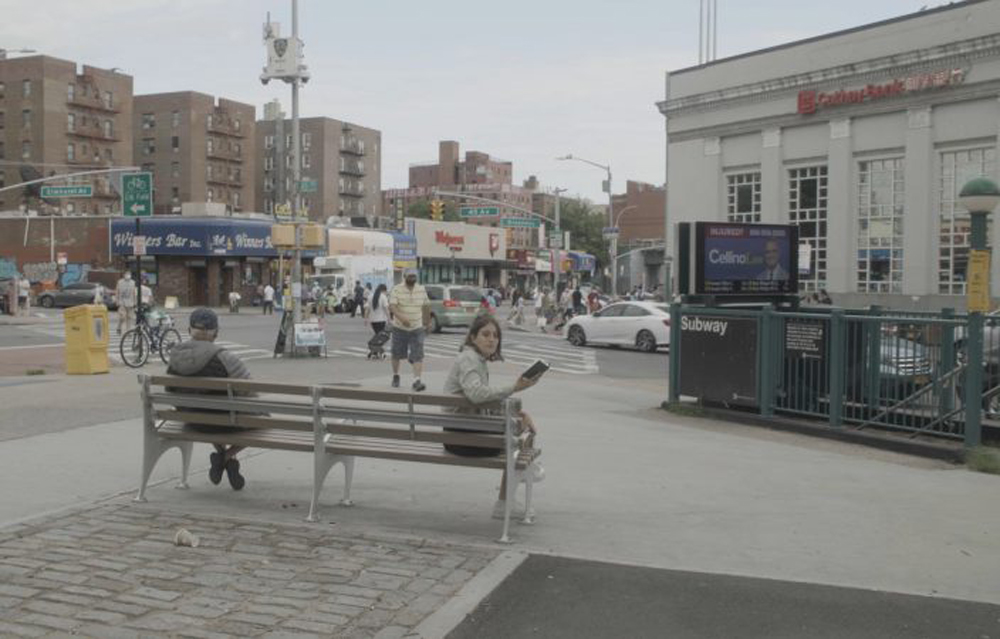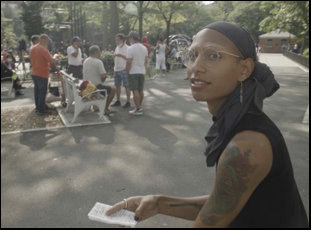Lynne Sachs showed a rough cut of her latest film “Swerve” to her mother, wanting to test out whether the meaning of words would come out even if she didn’t understand all the language when a bit of Tagalog is thrown into the mix of the mostly English-language short.
Paolo Javier: I’ve known Lynne for quite a while now and in terms of the pandemic, time has been really altered forever right, so I’m hanging onto all those seconds I’ve known Lynne and doubling the length. [laughs] I’m a big admirer of hers and we just clicked as friends. Lynne also is a poet and for this particular film, I had a book that was forthcoming and I asked Lynne if she would like to collaborate on something to occasion the release of the book. It could be really any form that she wants to take. I didn’t expect it being the film that Lynne ended up making, and I say this with awe and astonishment and just deep humility because I’m just over the moon. Every time I watch “Swerve,” I get something new from it. But [initially it was] the idea of doing something low-key and not necessarily elaborate, and collaborations take a life of their own.
Lynne Sachs: I just adore the way that Paolo puts words together, and the way that he listens in a parallel fashion to a documentary maker because you’re always soaking up the world, but as an experimental filmmaker, you listen to the world, and in this case, you observe with your ears, but then you allow yourself to rearrange the words to become more aware of their meaning outside or beyond or even within reality. One of the things that I wanted to do with this film was to examine what it meant to write poetry within a pandemic and specifically in a place that was a vortex of some of the worst hit communities, at least in the United States. That was Elmhurst, Queens, which that market you saw [in the film] was much more thriving than it is now before the pandemic. And in that community, there were so many languages, I started to think about, “Okay, you have Spanish, you have Chinese, you have Tagalog — so many different ways that different communities communicate and then you have poetry. [So I wondered] Can poetry be a language? Why does poetry always have to be part of a remove from the quotidian? And my goal was to make poetry quotidian, not just available or accessible or understandable, but more like let’s celebrate all the languages and then there’s this one which is Paolo Javier’s poetry language – it’s not just any poetry, but it’s his poetry. So I said could people speak in Javier?
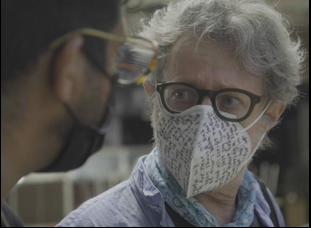
Lynne Sachs: I would say the images were my idea and I decided to do it in the Hong Kong Food Market, mostly because [Paolo] introduced me to it. Paolo was, for four years, the Queens poet laureate, so he got to know all the restaurants and he knows everyone. Food is a big part of our family’s relationship. We eat meals together, so it has to be about food, but not just look at these pretty plates and take pictures. It has to be eating. And we were supposed to shoot the whole film in that market, but then something called the Delta Variant came in and we almost canceled the whole thing. [The shoot] was pretty challenging to coordinate, and I’m actually glad that we have the masks in it because it’s more about now. We didn’t have to fake it.
For Paolo, I’m guessing the words were locked in, but was the meaning of them changing as this unfolded?
Paolo Javier: Yeah, I was hoping for the language to take a life of its own, especially as it’s spoken, uttered, performed by our individual actors, and one of the great experiences I have of watching “Swerve” is how much of a Lynne Sachs film it is. I really feel like I’m just a bit part in it, that it’s my poems that are being performed, but it’s its own thing and that’s what you hope for. The language that’s uttered by the actors, they’re performing sonnets — Shakespearean sonnets for that matter, so you have this tension between old form, but it’s not these are rhyming poems and the syntax is not really syntax, it’s more like parataxes where the word order is really slippery. There’s a lot of slippage just within the lines. So what I was really hoping was that the actors were not terrified by this poetry and they could really make it their own. Because it’s Lynne Sachs directing this, I think they knew what they were signing onto and made it their own within the space of HK Food Court in Elmhurst and also the space that Lynne gave them.
Lynne Sachs: Actually, Paolo, there’s a little bit of Tagalog in the film. What does that mean to you?
Paolo Javier: Well, this is actually something we discussed. Do we translate the Tagalog that appears in the film? I’m all for having captions, just for accessibility, but then this became an aesthetic consideration of do we include a translation of Tagalog. Lynne made the call to not translate it and as a sound poet, I have to respect that. Language is an aural experience, but [especially] pre-Hispanic, Filipino poetry is an aural experience, so to hear Tagalog spoken and experienced as a sound in a film that really asks you to open up your experience of language and poetry, I feel was a really daring decision, and aesthetically, it just makes sense. Legibility is always something that artists think about, some more than others, but this film came about in anticipation of a launch of a book of mine, an experimental comics book and the aim of the book when I was making it was to really blur the lines between poetry and comics, so I really feel that decision of not having Tagalog be translated is Lynne really taking the next step in terms of making a cinepoem, [where] it’s not a film striving to illustrate a poem.
Lynne Sachs: I did want to extract certain words and phrases and put them on screen. That was fun.
Paolo Javier: And Lynne shared several edits of this film and the decision to translate or not translate Tagalog comes out of the various edits that Lynne was making. This is what I love about cinema is just how hands on and how tactile all the elements are and that’s the kind of poet that I am with language. Lynne shared with me several versions of this film and asked what my opinion was and she was very generous to include me.
Lynne Sachs: Very precise notes. Very good notes.
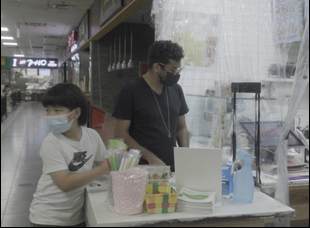
Lynne Sachs: Maybe I can talk a little bit about the actors because this text is pretty intimidating and there’s an old fashioned term in theater like oh you have to memorize your lines. This text is pretty intimidating — and only one person in the group really was capable of [memorizing and delivering] it — but I really liked their awkwardness [generally]. I like that they don’t own it and one guy who wrote it on his hands and you wouldn’t even see it, one wrote it on his mask. You would say it was on book [in film parlance], but also we are talking about something that comes from a book, so we want to say this is about reading. Paolo actually used a term when we were talking the film, “Ars Poetica” cinematically because it tells you about the ways that cinema or poetry picks up on how we conduct our lives, but then we’re given permission to rework it and throw it into a soup that doesn’t have a recipe. I really thought that was similar.
How did you end up with your ensemble?
Lynne Sachs: I’ll start with Inney Prakash — Paolo and I met Inney for the first time on Zoom in May of 2020 and we were supposed to teach a film and poetry workshop at Maysles Documentary Center and then the pandemic happened. And what’s incredible is [Inney] had just moved to New York and to have such a major impact on this city is amazing, so I had met him there and then he did his [virtual] film festival, Prismatic Ground, and when I saw him in the little box [on screen] when he was being a host, I thought he had a nice charisma and presence, so I asked him if he wanted to be in the film. I didn’t know that Inney is a professional actor basically — it’s not his main interest or commitment, but he’s been in theater and some film, so he came totally prepared. And Juliana Sass is someone I’ve known since she was a little baby and I think she’s a great actor. I always wanted to have her in a film and her mom is a good friend of mine, so I asked her to be in it and then I knew Jeff Preiss, a renowned filmmaker and a big supporter of independent film. He shot “Let’s Get Lost,” which was a classic on the ‘80s on Chet Baker, so I’ve admired lots of his work, but I almost could’ve guessed that he never did anything in front of the camera and out of the blue Paolo asked me if I happened to know Jeff…
Paolo Javier: Because during the pandemic, I was working at a different job as a curator and program director working from home remotely and while I’d assemble my programs, I’d just watch what films of Jeff Preiss I could just find online. At one point, I just kept rewatching his video of the REM song “Near Wild Heaven” and snippets of “Let’s Get Lost” and whatever I could find and I always have music or cinema on to sustain me, so I don’t get stuck. And when it came time to cast, I just asked Lynne, “do you know Jeff?” And I never would’ve imagined or even ever dared to ask Jeff [to be in the film], so that was Lynne’s idea.
Lynne Sachs: [Paolo] just wanted to know, “Do you know Jeff Preiss?” And [Jeff] burst out laughing when I asked him to do it. But I liked that. That’s one of the interesting things that happens in New York is that people wear different hats and you can be fluidly part of someone’s community and if you’re not very good at playing the piano, but a little good, then you can do it in the way that you don’t know it, but you’re into doing it.
Paolo Javier: Yeah, I never once doubted that Lynne would just engage all the performers in a meaningful way, just because I’ve seen what she’s done in her previous films. “Your Days, My Night” is one of my all-time favorite films, period and for Lynne to have assembled a crew and direct all of those performances in that film, [I thought] this film is a piece of cake. [laughs] And the other performers, Emmey Catedral and ray ferriera are from Queens and they’re both familiar with the park that is the other location of this film, so it was really important to include both in this film for that fact that they’re locals and this is a space that they frequented, but also they’re artists. They’re both good friends of mine who I participated in the Queens Biennial with in 2018, and there’s so much in the DNA of this film that’s in the DNA of other aspects of the location, so it’s really great that both said yes.
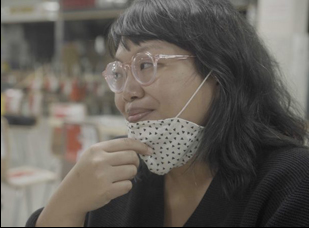
Lynne Sachs: That’s probably the most important question of all, really, at that moment in all of our lives. As the director, it was a major responsibility and I was a little scared for myself to be in this group dynamic, but I was even more scared because I was asking people to do something that could’ve compromised them. I was scared because I didn’t want to put anybody in a situation where they would either feel pressured or nervous or that they might get COVID, so some of them were willing to not wear the mask indoors and we were super strict.
Paolo Javier: Yeah, we had these deliberations several times and when Lynne made the call to do it, [she] had made an earlier call to pause it, and then said, “No, let’s just do it.” And following through was contingent on how we all felt when everybody gathered. It’s when we all got together and we were all outside of the space and just checked in to see how we were all feeling. That was empowering for me [because] you always take a risk, and it’s a legitimate consideration and a concern, but I trusted Lynne and I trusted everybody [else].
Lynne Sachs: We gave everybody a low pressure option not to show up.
Paolo Javier: Yes, that was really important. But they all showed up and I think they were excited and the shoot started off rainy and grey and drizzly and then the sun came out later in the afternoon and the community was out and it’s just beautiful, what Lynne was able to capture.
Lynne Sachs: One of my favorite moments was the end of the day we were in this playground park and all of a sudden all these middle-aged Filipino men show up and they all had prepared food and they put out this big spread…
Paolo Javier: Yeah, it was a picnic. They had pancit and lumpia and they meet there every Sunday.
Lynne Sachs: And then they offered the food to everyone in our production. That’s like 12 people.
Paolo Javier: They had enough and then some! [laughs]
“Swerve” will screen at BAMCinemafest as part of Shorts Program 2 on June 26th at 1:30 pm.




